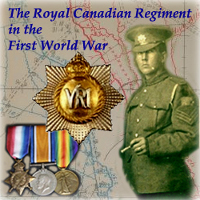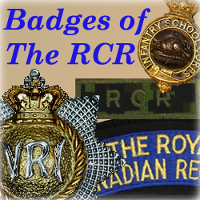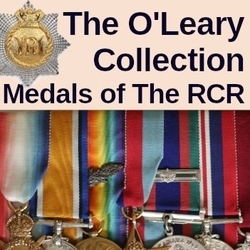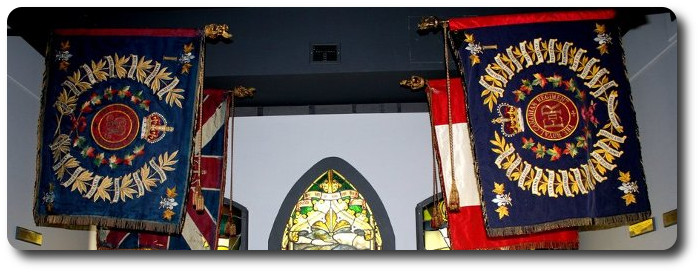
Researching The Royal Canadian Regiment
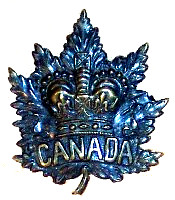
Badge worn by the Second (Special Service) Battalion of The Royal Canadian Regiment while serving in the South African War; 1899-1900.
The Story of an Emergency Ration
By: Gerald Cadogan
Reproduced from The Connecting File, 1967
Editor's Note: In 1902, under the pseudonym of "Gerald Cadogan", Pte RR Thompson, who won the Queen's Scarf of Honour for his actions on 18 and 27 February 1900, committed some of his impressions of the Boer War to paper in the form of short stories and a poem.
Before I took up arms on behalf of Her Most Gracious Majesty I sometimes wondered what an Emergency Ration was, and after no little mental distraction I arrived at the rather logical conclusion that it must of necessity be—a concentrated food to be used in case of necessity—True—I was young and guileless at the time and was unskilled in the art of warfare.
When we started fighting in 1899 we were each presented with a cylindrical shaped article which we were informed was an emergency ration. I was not told for what purpose it was intended but was warned not to interfere or attempt to consume this wonderful article under any circumstances, in fact, that I should first endeavour, to digest my haversack, water bottle and helmet before touching my emergency ration.
En Passant an officer was once heard to say to his men—"You can get killed, captured or die of starvation, but God help you if your emergency ration is not forthcoming at Kit inspection".
Then arose in my mind the question—what by all that's wonderful is an emergency ration—quick as a bolt from the blue came the answer—
When you've eaten your boots, haversack, helmet and equipment and there's nothing else to digest—that is what the red tapeists call an emergency.
Whilst pondering deeply on the thought of who the lucky recipient of my emergency ration would be when I had been found dead from starvation on the khaki veldt with nothing left but the barrel, bolt and magazine of my rifle—clutching between my lifeless fingers this wonderful emergency ration unopened along with a slip of paper bearing the significant words FAITHFUL UNTO DEATH—ah yes, I could fancy the man that gave the order saying as he raises his helmet—"he was a faithful soldier, let his ration be buried with him, he'll be kind of hungry when the last Roll Call sounds".
A horrid idea began to take possession of me, perhaps notwithstanding the label on the outside, it was an infernal machine to be used externally not internally as I had vainly supposed—and destined for others instead of myself.
Gingerly I examined the outside and smiled incredulously as I read—this package contains 1/4 lb of concentrated essence of beef and 1/4 lb of chocolate—ah no, my dear friend, I said, you can't fool me that way—I am not one of those fools that judge cigars by the label on the box, and wrapping the source of mystery carefully in my sleeping cap I laid it to rest in my haversack and thought no more about it.
One evening a few months later, it was a Saturday—we got orders to partake of a hasty meal and set off on a forced march after Cronje.
How we marched from 3 pm that afternoon until 6 am next morning, is by this time ancient history, but the memory of those two days, Saturday and Sunday Feb 17th and 18th 1900 are always with me, sleeping or waking. During that time some of the finest specimens of Canadian manhood laid down their young lives for the love of their Queen and the honour of the Empire. Some in awful agony, some painlessly but all unmurmuringly—I with more luck than I deserved escaped with a few bullets through my helmet and haversack.
When darkness put an end to the fighting on that never to be forgotten Sunday Feb the 18th 1900 at Paardeberg, during which we lost close on 1250 men, the sufferings of a wounded comrade demanded my attention, at 1.30 am on Monday the 19th being still on the battlefield with my chum surrounded as we were by the dead and dying, and not having had a bite to eat for 34V2 hours, and having marched 31 miles and fought for 14 hours during that, time, I began to feel weak from hunger and privation and the devil taking hold of me by the back of the neck—urged one to commit that most heinous crimes—for which I was afterwards tried and convicted. EATING MY EMERGENCY RATION.
How well I remember removing the band by which it was hermetically sealed and with beating heart and anxious mind eagerly examining the contented quarter of a pound of "genuine chocolate" appeared before my enraptured vision and ravenously clutching it, it swiftly disappeared down my oesophagus, the "concentrated essence of mule" likewise disappeared with lightning rapidity.
I had acted on the advice of the Immortal when he says—If twere done when tis done twere well it were done quickly—if but the assassination could trammel up the consequences and catch with his surcease success; if but this flow might be the all and the end all here—then here upon this bank and shoal of time I'd jump the life to come.
Stealthily like a criminal I regained my camp. Sleep forsook my wearied eyelids, and quivering in every limb I lay on the damp veldt awaiting the moment when the minions of the law would discover my awful crime and bring me before the Red Tape Tribunal. The long morning dragged wearily on, nights followed days and days nights, in monotonous succession—at first expecting and in the end fervently praying that the Sword of Damocles would soon descend, as I was consumed by the enormity of my crime, still cowardlike I was afraid to confess it.
The long expected came at last—I was arrested one fine morning and informed of the charge that was laid against me. When I realized that I was really arrested they tell me I fainted for joy.
Later I was brought before my judge who in solemn and funeral tones advised me to throw myself on the mercy of the court—and plead drunkenness—I denied the soft impeachment—and in my defence urged—starvation and extreme privations, but alas it was of no avail.
Fixing his eagle eye on me—in which I imagined I detected the glimmer of red tape—he poured forth the following invective worthy of the immortal Sheridan—"Prisoner, you stand convicted and rightly so, of one of the most heinous and abominable crimes it has ever been my most lawful duty to adjudicate on—it was a crime such as yours—tasting of the forbidden fruit-that brought death into the world with loss of Eden—in fact, all the ills that flesh is heir to—it is my bounden duty to inflict upon you the severest penalty the law allows (here I shudder) otherwise death by shooting—I say it is my bounden duty reservedly though as I have come to the conclusion that death by shooting is simply too good—(besides look at the ammunition that would be wasted) for a contemptible wretch like you—and it afford me an infinite amount of pleasure in sentencing you to Ten extra Guards—to be performed at the termination of each days march—and may the Lord have mercy on your sin steeped soul".
It is needless to state that the sentence was executed in all its severity during those nights that succeeded those awful marches and fights that took place between Paardeberg and Bloemfontein, during which I managed to eat another emergency ration without being discovered. I have since ascertained that this costly article costs our grateful government something in the region of 4 1/2d, consequently I am proud to serve under such an economising government.
